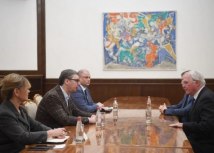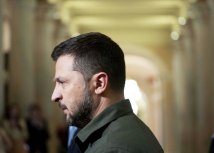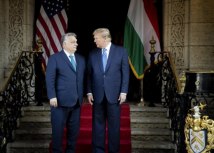EP: Kosovo no barrier to Serbian integration
European Parliament (EP) Rapporteur Jelko Kacin says Kosovo is no barrier to Serbia’s EU integration process.
Source: Beta, TanjugHe said that Serbia had “had a bit of a nap, a think” and had returned its ambassadors to those countries that had recognized Kosovo.
“First and foremost, Serbia has to work for itself, and I think that it can enter the EU considerably faster than Kosovo and be an example to Kosovo and help it,” Kacin told B92.
Asked about Serbia’s plans to ask the opinion of the International Court of Justice (ICJ) on Kosovo’s declaration of independence, the EP rapporteur replied that Serbia had a right to try anything it believed was productive, but that it would have to face the consequences.
“The chances of a miracle happening are very small. If someone asks for an opinion, they must be prepared to accept a decision,” cautioned Kacin.
He said that the EU mission to Kosovo was “a year and a half late,” labeling it a “failure of Serbian policy” in defending the rights of the Kosovo Serbs.
Kacin said that he had told the Serbian officials that he had spoken to yesterday that the EU could adopt the Transitional Trade Agreement with Serbia if the Stabilization and Association Agreement (SAA) was ratified by September 15.
Asked whether the visa regime for Serbian citizens traveling to EU countries would be scrapped by the end of next year, the rapporteur said that the EU was not hindering Serbia, as the problem with biometric ID cards and passports in Serbia was not an EU matter.
“We’ll honor our promises once Serbia completes everything that’s necessary,” he explained.
Kacin did not want to say directly whether Serbia could become an EU member by 2014, adding that it had been unrealistic to expect accession talks between the EU and Croatia to finish in the first half of 2010.
“We have to find a solution for Ireland, which rejected the Lisbon Treaty. Until Ireland makes its mind up, no other country can become a candidate. Afterwards, Serbia could become one of the first countries to receive candidate status,” said the rapporteur.
Speaking about his draft report on Serbia's progress, he said he would not be able to put it in procedure before the SAA with the EU was ratified by the Serbian parliament.
“Without SAA ratification there will be no report, let alone a positive one,” he said after meeting Deputy Speaker Gordana Čomić, urging the Serbian authorities and opposition to reach an agreement as soon as possible and do what was best for Serbia.
“Nobody except the Serbian parliament can pass the necessary legislation for harmonizing regulations with those in effect in Europe and thus accelerate Serbia's integration in the EU,” he noted.
Kacin said he must inform the EP next week whether the conditions for putting his report into procedure had been secured.
“It would be good if the report could be presented at the end of October or the beginning of November, when the European Commission is also due to present its report on Serbia's progress, in order to encourage Serbia's endeavors for EU integration,” he said.
Kacin added that he had conferred with Serbian War Crimes Prosecutor Vladimir Vukčević on the progress the latter's office had made in cooperation with the Hague Tribunal.
“After the arrest of Radovan Karadžić, no-one in Europe can believe any longer that Ratko Mladić is not in Serbia too,” he insisted, adding that Serbia had the capacity to capture him and extradite him to the Hague Tribunal speedily, and thus be relieved of the burden of his crimes in order to turn to its own future and Europe.
The EP rapporteur told the press that he would not be meeting Serb Radical Party (SRS) Deputy leader Tomislav Nikolić, and that this had not been his own decision, adding that his duty was to hear the official views of all parties, but whether they wanted to take this opportunity was up to them.
Čomić said that the SAA and its ratification had been the key issues of her conversation with Kacin.
The obstruction of parliament's work by the opposition was unproductive, she said, expressing hope that agreement on future work would be reached soon without denying any rights to the opposition.
The dialogue focused openly on the difficulties in parliament's work and on the job the parliament had to do in order to show the results that the EU was interested in, she said.




